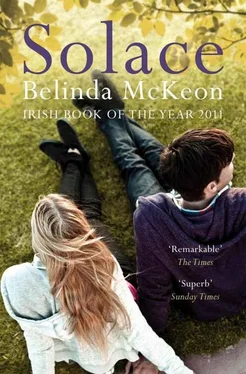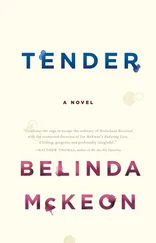‘Just need to make sure she’s still alive,’ she said, raising her eyebrows, as though to suggest the tediousness of the chore. ‘That kind of thing.’
‘Don’t fall asleep up there, now,’ Sarah called after her, and as Joanne stepped into the hall, she could hear that Aoife was awake. She tripped on the stairs. It must have been the wine.
The next morning, she took Aoife into town and bought her things. She bought her clothes in Dunnes and toys in the Early Learning Centre, and she went into Habitat and got some picture frames for her bedroom, and she took her into St Stephen’s Green and wheeled her around the flowerbeds and across the little bridge. She felt invisible; a woman with her child. There were so many of them around. Grafton Street was packed. She ducked up past Kehoe’s to get away from the crowds.
They had lunch in a café on Dawson Street. The waitress brought her a high chair so that Aoife could sit at the table with her. Afterwards, Joanne took out the little wooden farm animals she had bought her; they kept Aoife occupied long enough for Joanne to read almost a whole article in the Saturday magazine. Then she packed the animals away, and left the newspaper behind, and they walked out again into the sunshine. Joanne decided to walk through the grounds of Trinity, to find a bench and sit to soak up the day’s warmth.
Clive Robinson had aged so much in the space of a year that she barely recognized him. He must have been ill, she realized. He was walking towards the Berkeley Library, looking unsteady on his feet; maybe it was the cobblestones, but everybody else was walking on them perfectly well. She wanted for a second to avoid him, but she could not: he had seen her, and he was coming over. She waved and pulled the pushchair closer. As Robinson reached the bench, he pointed to the child with one hand and extended the other towards Joanne. He could not have looked more surprised. ‘This is news,’ he said, and he touched Aoife’s hair. She frowned up at him. ‘Bless every hair on her head,’ he said to Joanne. ‘She is yours?’
‘Mine.’ Joanne nodded, and they smiled at each other for a moment and then both looked down to the pushchair. ‘How are you?’ she heard herself ask in the very instant she warned herself, silently, not to ask that very question, and she cringed. She thought she saw him laugh a little as he sat on the bench beside her.
‘How am I?’ he said, and he made a face at the baby. ‘I’m seventy.’ He shook his head. ‘This is what seventy looks like.’ He turned to her. ‘I’ve seen better years, but I’m here. And you? Are you well?’
‘I’m fine,’ Joanne smiled. ‘This is Aoife.’
‘Aoife,’ he said, and he looked at the baby as though seeing her for the first time. ‘Which one was Aoife, again?’
Joanne hesitated. ‘I’m sorry?’
‘In the myths. Aoife was in the Children of Lir, am I right? Isn’t that where you find her name?’
‘Oh.’ Joanne nodded as though in agreement. ‘Right.’ In fact, she and Mark had not even considered the meaning of the name when they chose it. It had been one of the few they could agree on. But she wasn’t going to let Robinson know that, she decided. The legend was a better story. ‘We did wonder whether we’d have to give her three brothers,’ she laughed.
Robinson looked at her for a moment, and she knew she had said something wrong. ‘But Aoife was the wicked stepmother in that story, wasn’t she?’ he said, with the apologetic half-smile she remembered from whenever she had made a fool of herself in class. ‘Fionnuala was the girl, if I remember. And Fiachra, Conn and Aodh were the sons. Poor creatures. Nine hundred years as swans. Imagine their loneliness.’
Joanne searched for a response. ‘It can’t have been fun,’ she said, eventually, and she blushed at how inane it sounded. But what was she supposed to say? He was talking about a fairy story. He was feeling sympathy for people who had never lived. She looked around the square. ‘It’s a lovely day, isn’t it?’ she blurted.
Robinson leaned back into the green slats of the bench. ‘Spring again,’ he said.
Joanne felt relieved. They were back on some kind of normal track. She could manage this. ‘Are you busy, these days?’ she asked, and Robinson smiled and shook his head.
‘I’m doing very little,’ he said. ‘Doctor’s orders.’
‘I see,’ she said, trying to sound at once discreet and surprised. What was the etiquette in this situation? Were you meant to ask outright?
‘It is cancer,’ Robinson said, as though answering a very specific question. ‘But it seems the doctors got to it in time, and that I’m off the hook for now.’ He glanced at her. ‘Though I’m aware that it doesn’t look that way.’
‘Oh, no, no,’ Joanne said, in a rush. ‘I mean, you look thinner than before, maybe, but,’ she nodded vigorously, ‘you look good.’
‘There was radiation therapy, there was chemotherapy, and there have been drugs,’ Robinson said lightly. ‘The drugs have not been allowing me to sleep so well, I find. But that’s not a bad price to pay for life, is it?’
‘Of course not.’
‘Which you, more than any of us, should know,’ he said, looking at her almost mischievously.
‘Oh, yes,’ she said, though it was clear that she did not know his meaning.
‘New motherhood.’ He put a hand to the pushchair. Aoife was leaning out of it, staring at the passing pigeons. ‘New life, in exchange for an end to nights of any sleep worthy of the name. Isn’t that how it goes?’
‘Oh, yes,’ Joanne said, with altogether more certainty. ‘Yes, it definitely is.’
‘I remember those nights. Of course, my wife did most of the work — that was the way then — but still, I remember.’ He laughed. ‘My God, the stamina these little creatures have for their own discontent.’ He leaned to look at Aoife again. ‘It’s remarkable, when you think about it. We spend our first years in this world furiously refusing the luxury of what we’ll spend the rest of it longing to do.’ He sat back on the bench. ‘Sleep, that is.’
‘Her father helps out a lot, though,’ Joanne said, after a long moment of silence. ‘I mean, her father actually looks after her most of the time. I’m at work.’
‘That’s admirable,’ said Robinson.
‘He’s doing a PhD in the English department here, actually,’ Joanne said, and she pointed to the arts block, as though Robinson needed the illustration. ‘On Maria Edge-worth and Walter Scott.’ She thought for a moment. What was it about those writers, exactly, that Mark was working on, again? Robinson was sure to ask her. ‘Their novels,’ she added pointlessly.
‘I see,’ said Robinson, but he did not ask for any more details. He seemed to have no interest. And she wanted him to be interested, Joanne realized. She wanted Robinson to ask about the man she had met, the man she had made a child with. But he just sat beside her and lifted his face to the sun. He closed his eyes. From her pushchair, Aoife called out.
‘We’re going in a minute now,’ Joanne said to her, and Robinson stirred beside her.
‘I don’t want to hold you up, my dear,’ he said quietly. ‘You go on ahead. I’m just going to catch my breath here.’
‘Oh, no, there’s no rush,’ said Joanne. ‘I was talking to the child.’
Robinson opened his eyes and peered at Aoife. ‘Do you have good conversations, the two of you?’ he said, and Joanne wondered which of them he was addressing. ‘And you have an interesting case to work on now?’ he said then, and this time he was looking directly at her.
Joanne shrugged. ‘Not really,’ she said. ‘A lot of the work is very dull.’
‘Ah,’ he said.
Читать дальше












